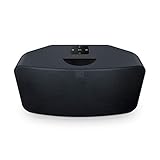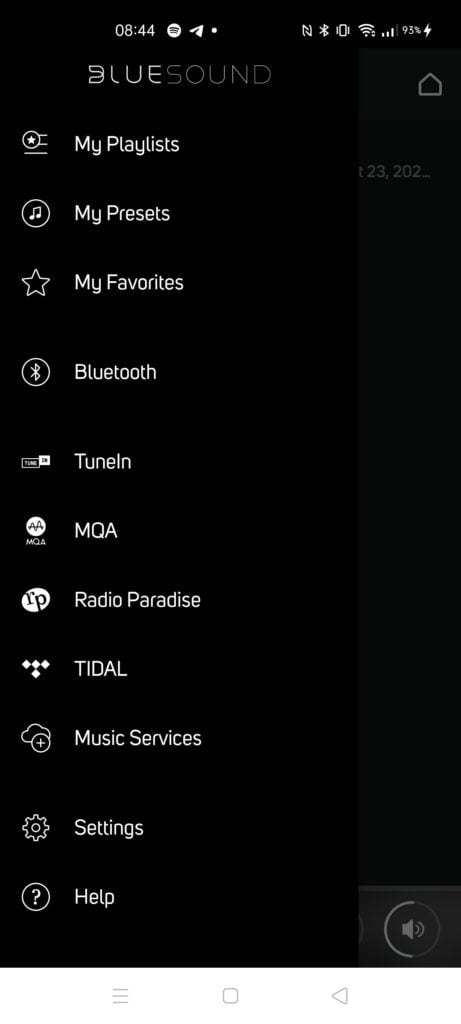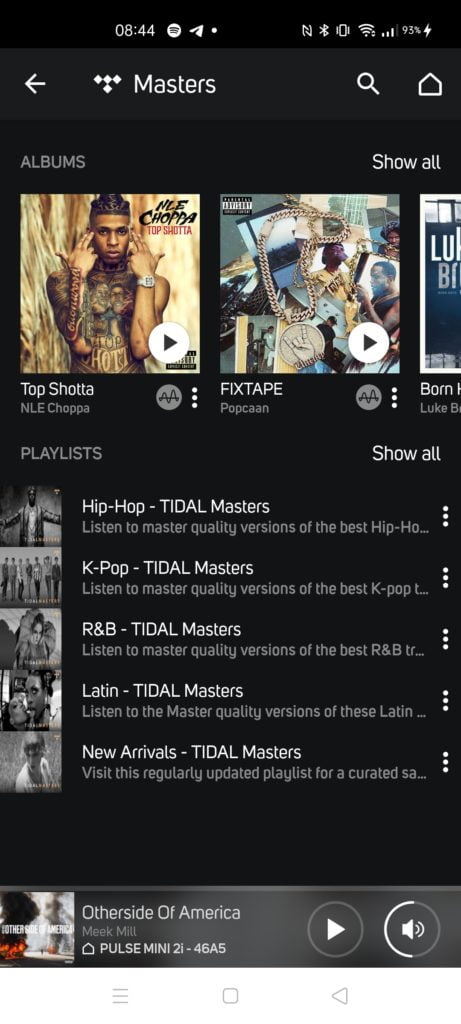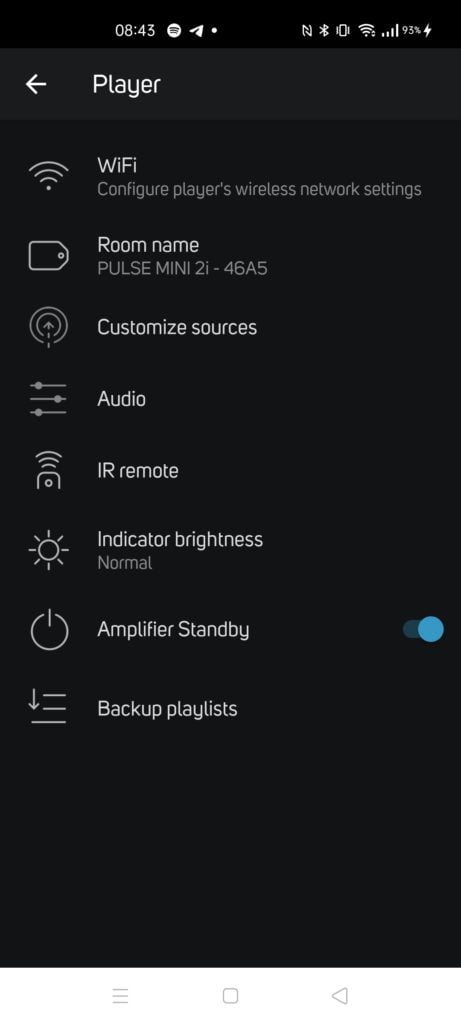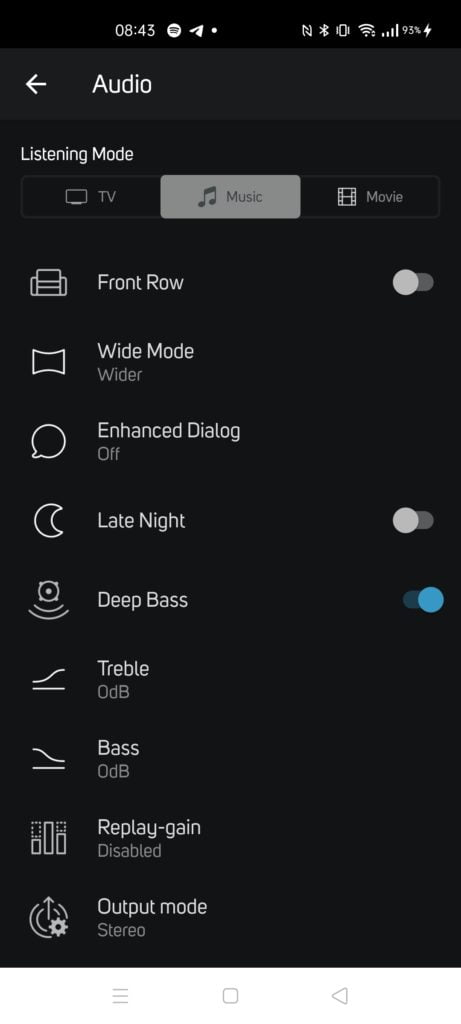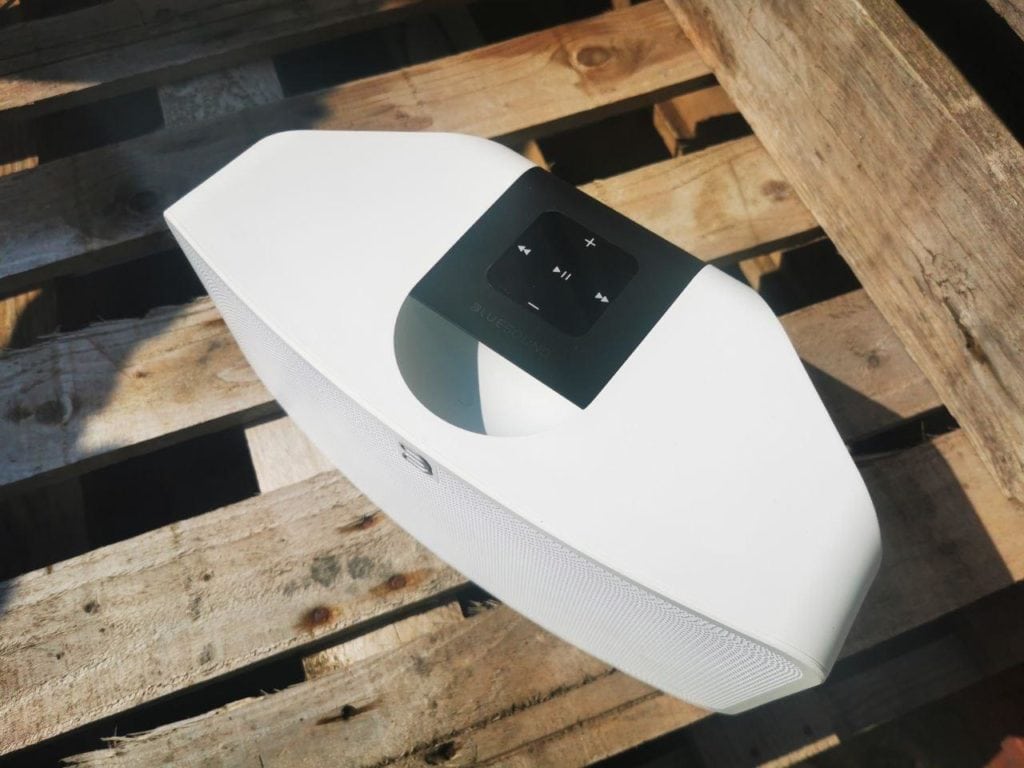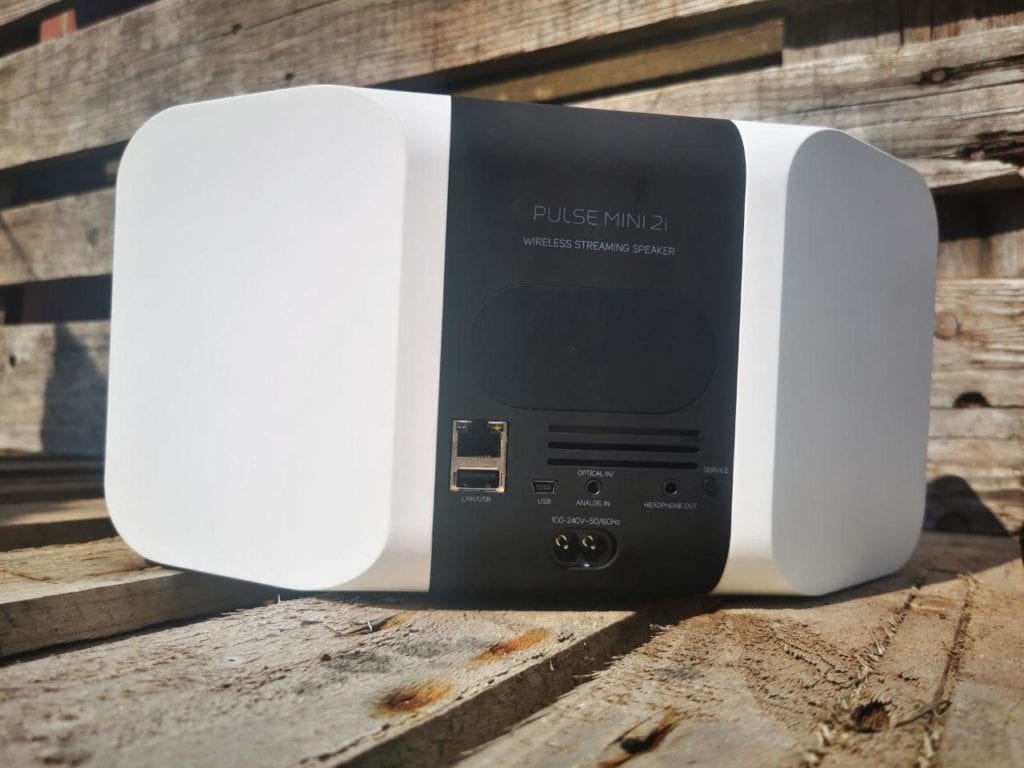Sonos may dominate the world of multiroom streaming speakers, but they are not necessarily the best all round. Bluesound has supported hi-resolution audio formats from the beginning, offering a key feature that Sonos, previously, did not offer.
Things have changed a little since the launch of the Sonos S2 platform, which now offers hi-resolution formats, but Bluesound is still a contender for audio enthusiasts wanting the convenience of a multi-room system.
Features
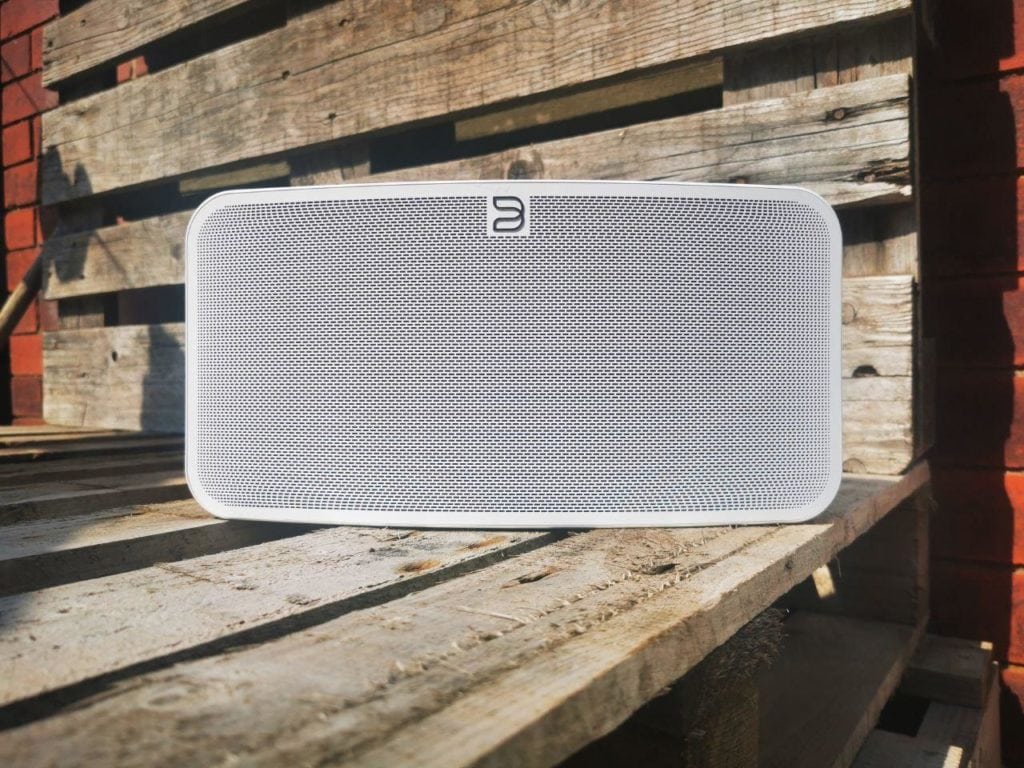
- An innovative dual acoustic chamber results in a stunning, size-defying performance.
- Experience deep bass and full-range sound free from distortion.
- Dual band Wi-Fi and support for 2-way Bluetooth aptX HD ensures music playback without interruption.
- Group two PULSE MINI 2i’s together for a seamless stereo pairing.
- Designed to fit seamlessly into your home decor.
- Control music wirelessly with the intuitive BluOS Controller app for iOS, Android, Kindle Fire, and Windows & Mac OS X desktops.
- Control it with the optional Bluesound RC1 Remote Controller
- Connect Bluesound to your Amazon Echo with the skill in the Alexa app and use Amazon’s Alexa voice assistant to control Players around the home.
- AirPlay 2 lets you play music or podcasts from wireless speakers throughout your house — all in sync.
Bluesound Pulse Mini 2i vs Pulse Flex 2i vs Sonos Play:5
Bluesound is probably the best alternative to Sonos, currently, the Pulse Flex 2i Mini is priced the same as the Sonos Play:5, but it is quite a bit smaller and lighter.
There is also the Pulse Flex 2i which is £699 so £200 more than the Sonos, this is also quite a bit smaller than the Sonos. Compared to the Mini it offers 50% more power with the woofers being significantly larger in comparison to both the Mini and Sonos.
I have not used the more expensive Flex 2i or the Sonos Play:5 so can’t compare how they actually sound, but the following spec sheet compares the various features and hardware.
| Bluesound Pulse Flex 2i Mini | Pulse Flex 2i | Sonos Play:5 | |
|---|---|---|---|
| Price | 499 | 699 | 499 |
| Dimensions | 335 x 172 x 155 mm | 420 x 198 x 192 mm | 203 x 364 x 154 mm |
| Weight | 3.6 kg / 7.9 lbs | 5.05kg/11.11lbs | 6.3kg |
| Speakers | 2 x 4” (102mm) Woofers 2 x 3/4” (19mm) Tweeters |
2 x 5.25” (133mm) Woofers 2 x 1” (25mm) Tweeters |
3x 100mm long-throw mid-woofers 2x 20mm tweeters 1x 22mm tweeter |
| Power Output | 100 watts of total system power | 150W total system power, bi-amplified 65W x 2 Woofer; 10W x 2 Tweeter |
Not stated |
| Native Sampling Rates | 32 – 192 kHz | 33 – 192 kHz | Supported up to 48,000 Hz |
| Bit Depths | 16 – 24 | 17 – 24 | 16-bit Sonos S2 – 24-bit (44.1kHz/48kHz, FLAC/ALAC) |
| Frequency Response | 50Hz – 20kHz ±1.5dB, -10dB @ 40Hz | Frequency Response: 40Hz – 20kHz ±1.5dB, -10dB @ 33Hz | Not stated |
| Voice Control | Amazon Alexa & Google Assistant Skills | Amazon Alexa & Google Assistant Skills | Amazon Alexa & Google Assistant Skills |
| Network Connectivity | Gigabit Ethernet RJ45 Wi-Fi 5 (802.11ac, dual-band) |
Gigabit Ethernet RJ45 Wi-Fi 5 (802.11ac, dual-band) |
100Mbit Ethernet RJ45 802.11b/g, 2.4 GHz |
| Audio Input/Output | USB, Toslink/3.5mm, WiFi/Ethernet (cloud services and LAN) | USB, Toslink/3.5mm, WiFi/Ethernet (cloud services and LAN) | Line-in WiFi/Ethernet (cloud services and LAN) |
| Free Internet Radio | TuneIn Radio, iHeartRadio, Calm Radio Radio Paradise, LiveXLive, Radio.com |
TuneIn Radio, iHeartRadio, Calm Radio Radio Paradise, LiveXLive, Radio.com |
|
| Cloud Services | Spotify, Amazon Music HD, TIDAL, Deezer Qobuz, HighResAudio (VAULT Required), Napster, KKBox Bugs, Taihe Music ZONE, SoundMachine, IDAGIO, OraStream |
Spotify, Amazon Music HD, TIDAL, Deezer Qobuz, HighResAudio (VAULT Required), Napster, KKBox Bugs, Taihe Music ZONE, SoundMachine, IDAGIO, OraStream |
7Digital, Amazon Music, Dar.fm, Deezer, Google Play Hearts of Space, iHeartRadio, JB Hi-Fi NOW, JUKE, MLB.com Gameday Audio Murfie, Napster®, Pandora®, Qobuz, Rdio®, Rhapsody®, SiriusXM  Internet Radio Internet RadioSlacker® Radio, Songza, Spotify®, Stitcher SmartRadio  TIDAL, TuneIn, Concert Vault, WiMP |
| Supported file formats | MP3, AAC, WMA, OGG, WMA-L, ALAC, OPUS
Hi-Res formats – FLAC, MQA, WAV, AIFF |
MP3, AAC, WMA, OGG, WMA-L, ALAC, OPUS
Hi-Res formats – FLAC, MQA, WAV, AIFF |
MP3, iTunes Plus, WMA (including purchased Windows Media downloads), AAC (MPEG4) AAC+, Ogg Vorbis, Audible (format 4), Apple Lossless, Flac, WAV, AIFF |
Compatible music services
Bluesound supports a wide range of music services including:
Spotify, Amazon Music HD, TIDAL, Deezer Qobuz, HighResAudio (VAULT Required), Napster, KKBox, Bugs, Taihe Music ZONE, SoundMachine, IDAGIO, OraStream.
One notable missing service is YouTube Music/Google it is something I have started to use recently so disappointing it is not there.
The speaker does have Bluetooth though, so technically it is compatible with everything. The Bluetooth is compatible with aptX HD so you can still stream any high-resolution audio this way.
Set up & App
Set up is similar to most IoT/Smart Home devices, and Sonos, download the BlueOS app, and it will identify the speaker then you pass the Wi-Fi login details over.
It was one of the more problematic devices I have used recently getting it to work. The initial connecting to Wi-Fi process takes quite a while, so you are not sure if it has worked or not. If the speaker gets unplugged, I seem to have to reset it up, and it can be 50/50 if the Wi-Fi settings get passed over. Some of this could be down to the way my Huawei P30 Pro deals with Wi-Fi connections.
Opting for an Ethernet connection is both easier and more reliable (like most products) and since switching to this it has worked perfectly.
In the past, I have found Sonos a bit of a nightmare to set up, switching Wi-Fi SSID was a particularly frustrating process. So I wouldn’t say the Bluesound speaker is much worse in this regard.
BlueSound at least support dual-band Wi-Fi 5 vs 2.4Ghz only of Sonos. I find that a lot of 2.4Ghz only IoT devices will struggle with connecting when you choose an SSID that has 5GHz/2.4Ghz coexistence. 5GHz is just better too.
One feature I did like was the facts that the speaker has its own web hosted configuration page, so you can set up the various services via your desktop browser rather than the mobile app.m
In use
Once set up the system works in a similar manner to my Sonos. One exception is that Bluesound requires you to connect to Spotify via the Spotify app rather than the app having direct control of Sonos. I think this is Spotify issue, not Bluesound, though.
The Pulse Mini 2i offers room-filling audio with a soundstage far bigger than its diminutive size.
Detail is superb offering excellent clarity between the frequency with no distortion or harshness in either the highs or lows.
You can tweak the audio to you liking with the usual treble and bass settings but also a toggle for deep bass. Depending on your musical and audio preferences, I find this sound better with the deep bass on, especially when it comes to things like hip hop. Playing JU$T by Run The Jewels sounds significantly better with the bass toggle, it goes from a slightly flat sounding track to having bass-heavy beats like it is supposed to. It won’t compete against a speaker with a dedicated subwoofer but it is comparable with the Huawei Sound X with its dual push-push woofers designed by Devialet.
While the Sonos S2 systems will technically support the MQA (Master Quality Authenticated) audio from Tidal, I am currently unable to access the playlists when browsing Tidal from the Sonos app, nor does it give me any indication of the quality that is being played. This is likely because high-resolution audio has not been rolled out yet.
So this is one area that Bluesound still has a big advantage, connecting to Tidal I have full access to the MQA tracks. The quality of my hearing and appreciation of music is not quite the same as some audiophiles, but there is a noticeable difference when listing to tracks in high resolution, you can hear much more of the independent elements of each track vs lower-quality audio. I am not entirely sure that is worth the exorbitant fees Tidal charges, but audiophiles regularly have to pay over the odds to achieve the quality they desire.
Price and Competition
The Sonos Play:5 is clearly the main alternative, being the same price. With Sonos recently updating to the S2 system but dropping support for older speakers making them useless with S2 systems, this has caused a bit of backlash. So if this is something that bothers you, then Bluesound could be the best alternative.
Denon also does a range of speakers, with the Home 250 being priced similarly and the HEOS ecosystem also covering their AV receivers and the DHT-S516 soundbar.
Harman Kardon is another option, you can pick up the Citation 500 for a little more than the Pulse 2i Mini, at £579 which offers double the power output. Alternatively, a pair of Citation 300 speakers cost just a little more at £518.
Overall
The Bluesound Pulse 2i Mini is superb, offering incredible sound at a not unreasonable price all in a small package.
For the time being at least, they still have the advantage over Sonos by offering high-resolution audio.
The BlueOS app does a good job of competing with the Sonos equivalent, but I did encounter quite a few issues with the setup process, and I don’t find either system particularly user friendly to get working.
